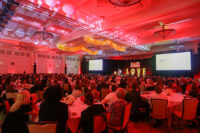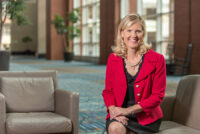Demand rises for unique meeting locations
Event planners are choosing distinctive Virginia venues — from art museums to racetracks — to create memorable experiences.
VA1 Summit gives tourism pros chance to talk
Virginia tourism leaders will gather in Danville for the annual VA1 Summit to discuss innovation, AI and the future of travel.
Notable hotels opening across Virginia
Virginia’s hotel sector remains strong despite reduced federal travel, with new luxury and boutique properties opening statewide.
Live conventions return but face rising costs
Event planners across Virginia say meetings and conventions are thriving again, even as costs and expectations climb.
Opening doors
The Hard Rock entertainment, gaming, and hospitality brand is solidifying its place in Bristol on Nov. 14 with the formal opening of its Hard Rock Hotel & Casino Bristol, a $515 million resort and casino. The company has had a presence in the city for the last two years via a temporary casino facility, but […]
Coming to town
People who attended the annual Virginia Fire Rescue Conference in February could buy the latest rescue equipment, tools, turnout gear, radios, oxygen tanks — even a 30,000-pound pumper fire truck. “If you’ve got your checkbook … you can drive that truck home,” says Christian Eudailey, executive director of the Virginia Fire Chiefs Association, which organizes […]
Meeting of the minds
Inclusive narratives, a post-pandemic restaurant industry and artificial intelligence are just a few of the topics that will feature in this year’s VA1 Governor’s Tourism Summit, an annual gathering of tourism professionals from across the state and beyond. Scheduled Nov. 13-15, the 2024 VA1 Governor’s Tourism Summit will take place at Hot Springs’ The Omni […]
High cost, higher rewards
Michael Meyers is always looking for an advantage. Like many in the meetings industry, the Greater Richmond Convention Center’s general manager has seen his facility’s costs spike from inflation. Likewise, the price tag to run conferences has increased, so planners and venues are striving to ensure a good return on investment for attendees. And to […]
Distinguished visitors
Event planners and hospitality industry experts worldwide will converge upon Richmond to grow their professional networks, discuss the latest developments in the tourism sector and celebrate travel in Virginia during the 2023 VA1 Governor’s Tourism Summit. Taking place Nov. 12-14 at the Greater Richmond Convention Center, the event will offer workshops and classes focusing on […]
Conventional wisdom
Business-related travel and events are slowly making a comeback in the post-pandemic era. In 2022, visitors to Virginia spent $30.3 billion in the commonwealth, exceeding 2019 spending by 4%. Of that spending, $4.8 billion was from business travelers, says Dan Roberts, vice president of research and strategy for Virginia Tourism Corp. While none of the […]






















